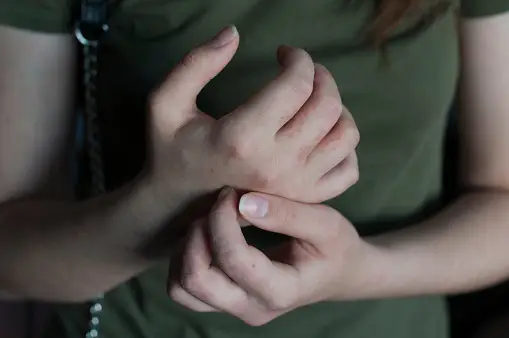
Itchy hands can be an irritating and uncomfortable condition, affecting daily activities and quality of life. This sensation can be triggered by a variety of factors, ranging from simple dryness to more complex medical conditions. Understanding the causes of itchy hands is essential for effective treatment and prevention. This detailed guide explores the common and less common causes of itchy hands, their symptoms, and potential treatments, providing readers with a thorough understanding of this bothersome condition.
Understanding Itchy Hands
Common Causes
1. Dry Skin (Xerosis)
Overview: Dry skin, or xerosis, is one of the most common causes of itchy hands. It often results from environmental factors, such as cold weather, low humidity, or frequent hand washing, which strip the skin of its natural oils.
Symptoms:
- Rough, flaky skin
- Redness and cracks
- Tightness or discomfort
- Persistent itching
Treatment:
- Use moisturizing creams or lotions regularly, especially after washing hands.
- Opt for gentle, fragrance-free cleansers to avoid further irritation.
- Use a humidifier to add moisture to the air during dry seasons.
- Wear gloves to protect hands from harsh environmental conditions.
2. Eczema (Atopic Dermatitis)
Overview: Eczema is a chronic skin condition that causes inflammation, redness, and itching. It is often seen in individuals with a family history of allergies or asthma.
Symptoms:
- Red, inflamed patches on the skin
- Severe itching, especially at night
- Dry, scaly skin that may crack and bleed
- Thickened, leathery skin from chronic scratching
Treatment:
- Topical corticosteroids to reduce inflammation and itching.
- Moisturizers to keep the skin hydrated and prevent flare-ups.
- Avoiding triggers such as certain soaps, detergents, and allergens.
- Antihistamines to relieve severe itching.
3. Allergic Contact Dermatitis
Overview: Allergic contact dermatitis occurs when the skin comes into contact with an allergen, causing an immune reaction that leads to itching and inflammation.
Symptoms:
- Red, itchy rash at the site of contact
- Swelling and blisters in severe cases
- Dry, cracked, and scaly skin
- Symptoms appear within hours to days after exposure
Treatment:
- Identifying and avoiding the allergen responsible for the reaction.
- Topical corticosteroids to reduce inflammation and itching.
- Oral antihistamines to alleviate severe itching.
- Calamine lotion or cool compresses to soothe the skin.
4. Irritant Contact Dermatitis
Overview: Irritant contact dermatitis is caused by exposure to irritants, such as harsh chemicals, detergents, or solvents, which damage the skin’s protective barrier.
Symptoms:
- Red, itchy rash at the site of contact
- Burning or stinging sensation
- Dry, cracked, and scaly skin
- Symptoms appear soon after exposure
Treatment:
- Avoiding the irritant responsible for the reaction.
- Using protective gloves when handling irritants.
- Applying moisturizers to repair the skin barrier.
- Topical corticosteroids to reduce inflammation and itching.
5. Psoriasis
Overview: Psoriasis is a chronic autoimmune condition that causes rapid skin cell turnover, leading to thick, red, scaly patches on the skin.
Symptoms:
- Red, raised patches covered with silvery scales
- Itching and burning sensation
- Dry, cracked skin that may bleed
- Symptoms can flare up and subside periodically
Treatment:
- Topical treatments, including corticosteroids, vitamin D analogs, and retinoids.
- Phototherapy (light therapy) to slow skin cell turnover.
- Systemic medications, such as methotrexate or biologics, for severe cases.
- Moisturizers to keep the skin hydrated and reduce scaling.
Less Common Causes
1. Infections
Overview: Bacterial, fungal, or viral infections can cause itching in the hands. Common examples include impetigo, fungal infections like athlete’s foot (tinea), and herpes simplex virus.
Symptoms:
- Redness and swelling
- Itching and pain
- Blisters, pustules, or scaly patches
- Fever and malaise in severe cases
Treatment:
- Antibiotics for bacterial infections.
- Antifungal creams or oral medications for fungal infections.
- Antiviral medications for viral infections.
- Keeping the affected area clean and dry to promote healing.
2. Systemic Conditions
Overview: Certain systemic conditions, such as liver disease, kidney disease, and diabetes, can cause itching in the hands and other parts of the body.
Symptoms:
- Persistent itching without a visible rash
- Symptoms related to the underlying condition, such as jaundice (yellowing of the skin and eyes) in liver disease or increased thirst and urination in diabetes
- Fatigue and malaise
Treatment:
- Managing the underlying condition through medications and lifestyle changes.
- Antihistamines to relieve itching.
- Moisturizers and topical treatments to soothe the skin.
- Regular monitoring and follow-up with healthcare providers.
3. Nerve Disorders
Overview: Nerve disorders, such as carpal tunnel syndrome or neuropathy, can cause itching, tingling, and numbness in the hands.
Symptoms:
- Itching and tingling sensation
- Numbness and weakness in the hands
- Pain that may extend to the forearm
- Symptoms worsen with repetitive hand movements
Treatment:
- Rest and avoiding activities that exacerbate symptoms.
- Splints or braces to support the wrist and reduce pressure on the nerves.
- Physical therapy to strengthen muscles and improve nerve function.
- Medications, such as pain relievers or anti-inflammatory drugs.
- Surgery in severe cases to relieve pressure on the nerves.
Home Remedies and Prevention
1. Moisturizing:
- Regularly apply moisturizing creams or lotions to keep the skin hydrated.
- Use products with ingredients like glycerin, shea butter, or hyaluronic acid.
2. Avoiding Triggers:
- Identify and avoid allergens or irritants that cause itching.
- Use hypoallergenic and fragrance-free products.
3. Good Hygiene:
- Wash hands with gentle, moisturizing soap.
- Pat hands dry instead of rubbing them.
4. Protective Measures:
- Wear gloves when handling harsh chemicals or cleaning agents.
- Use gloves in cold weather to prevent dryness and irritation.
5. Healthy Lifestyle:
- Stay hydrated by drinking plenty of water.
- Maintain a balanced diet rich in vitamins and minerals.
- Avoid excessive alcohol and caffeine, which can dehydrate the skin.
When to Seek Medical Attention
While itchy hands are often a temporary and manageable condition, it is important to seek medical attention if you experience any of the following:
- Severe or persistent itching that does not improve with home remedies.
- Itching accompanied by other symptoms, such as redness, swelling, or blisters.
- Signs of infection, such as pus, fever, or increased warmth.
- Itching that interferes with daily activities and sleep.
- Symptoms of an underlying condition, such as jaundice, increased thirst, or numbness.
A healthcare professional can provide a proper diagnosis and recommend the most effective treatment plan, which may include prescription medications or further tests to identify underlying conditions.
Itchy hands can be caused by a variety of factors, ranging from simple dryness and eczema to more complex conditions such as infections, systemic diseases, and nerve disorders. Identifying the underlying cause is crucial for effective treatment and prevention. By maintaining good hand hygiene, using moisturizers, avoiding triggers, and seeking appropriate medical care when necessary, individuals can manage the symptoms of itchy hands and improve their quality of life. If you experience persistent or severe itching, it is important to seek medical advice to ensure proper diagnosis and treatment. Understanding the diverse factors that contribute to itchy hands allows individuals to take proactive steps to alleviate discomfort and maintain healthy skin.



